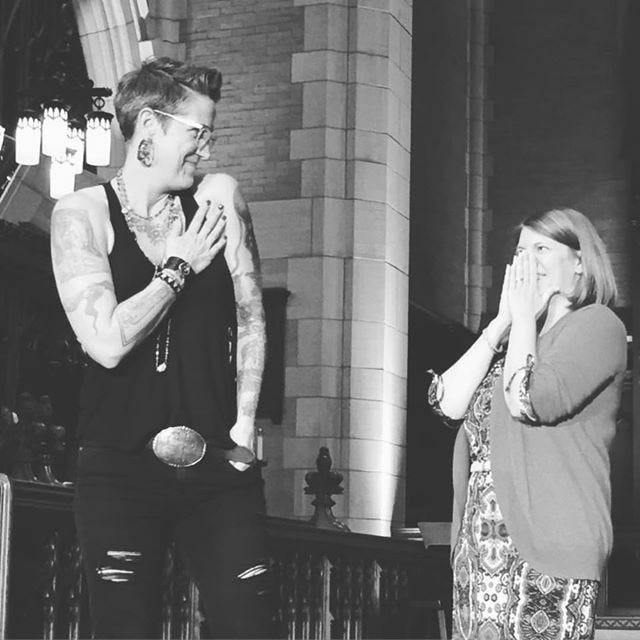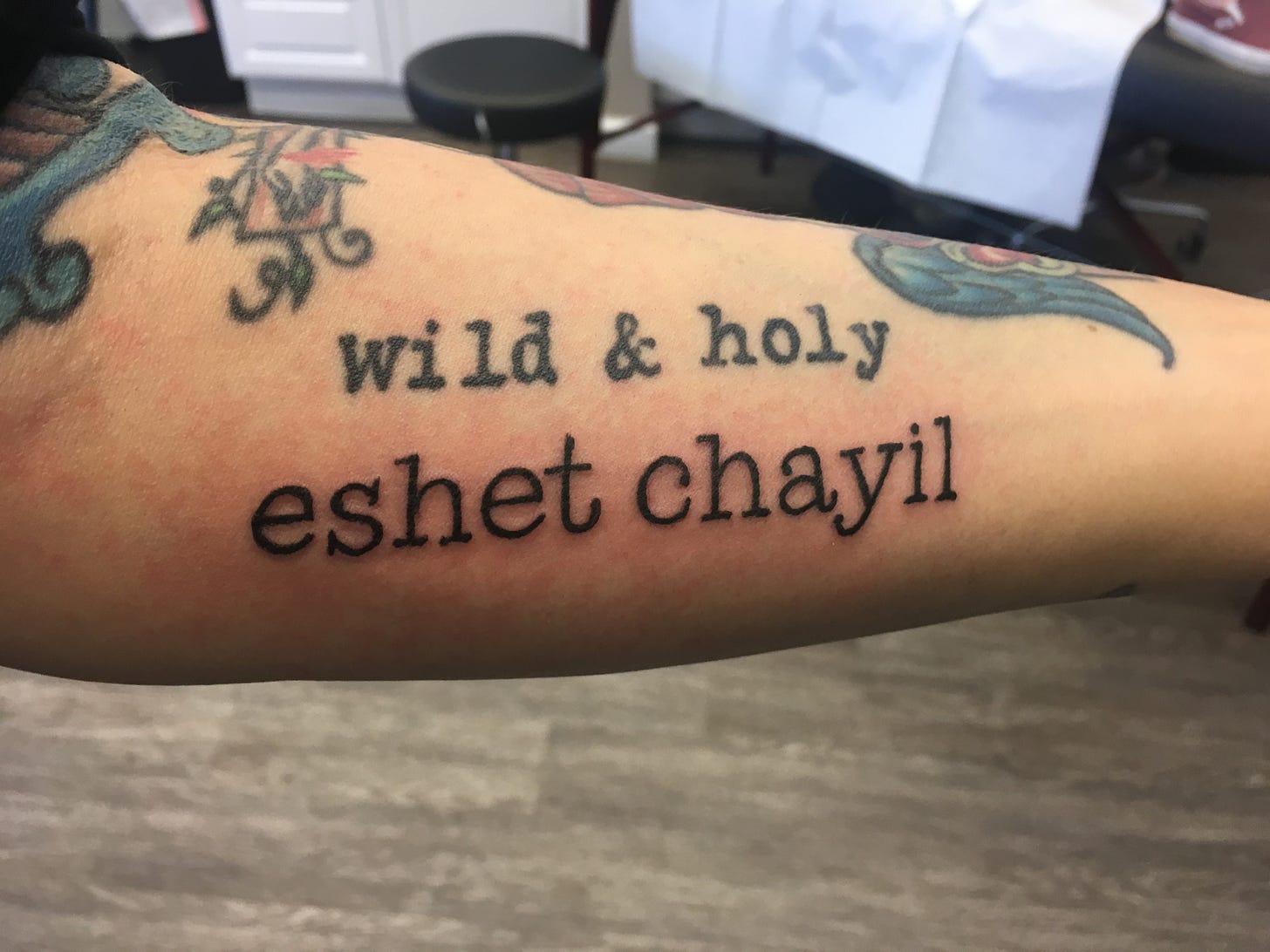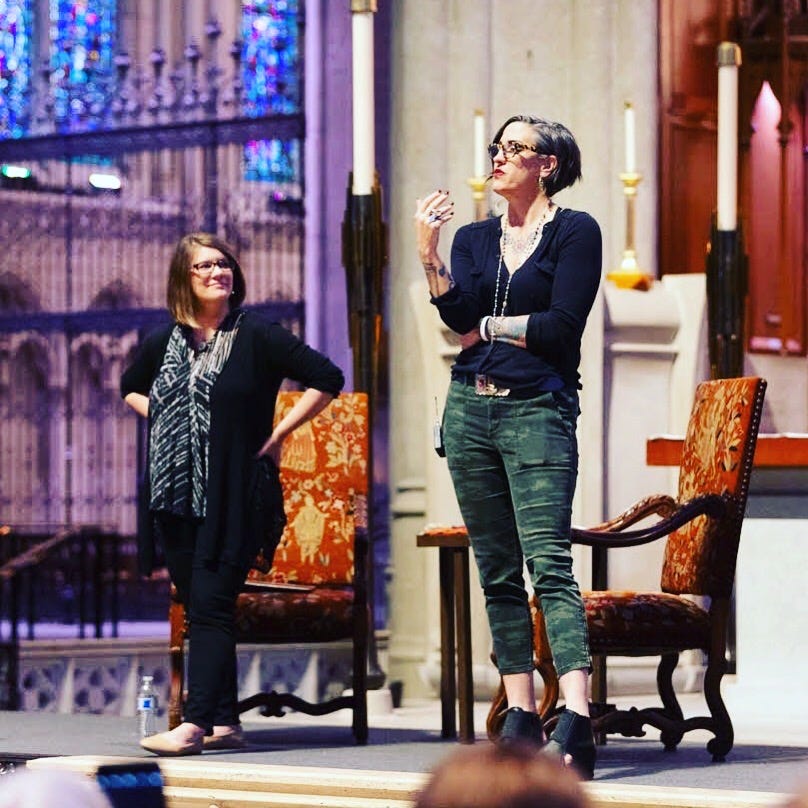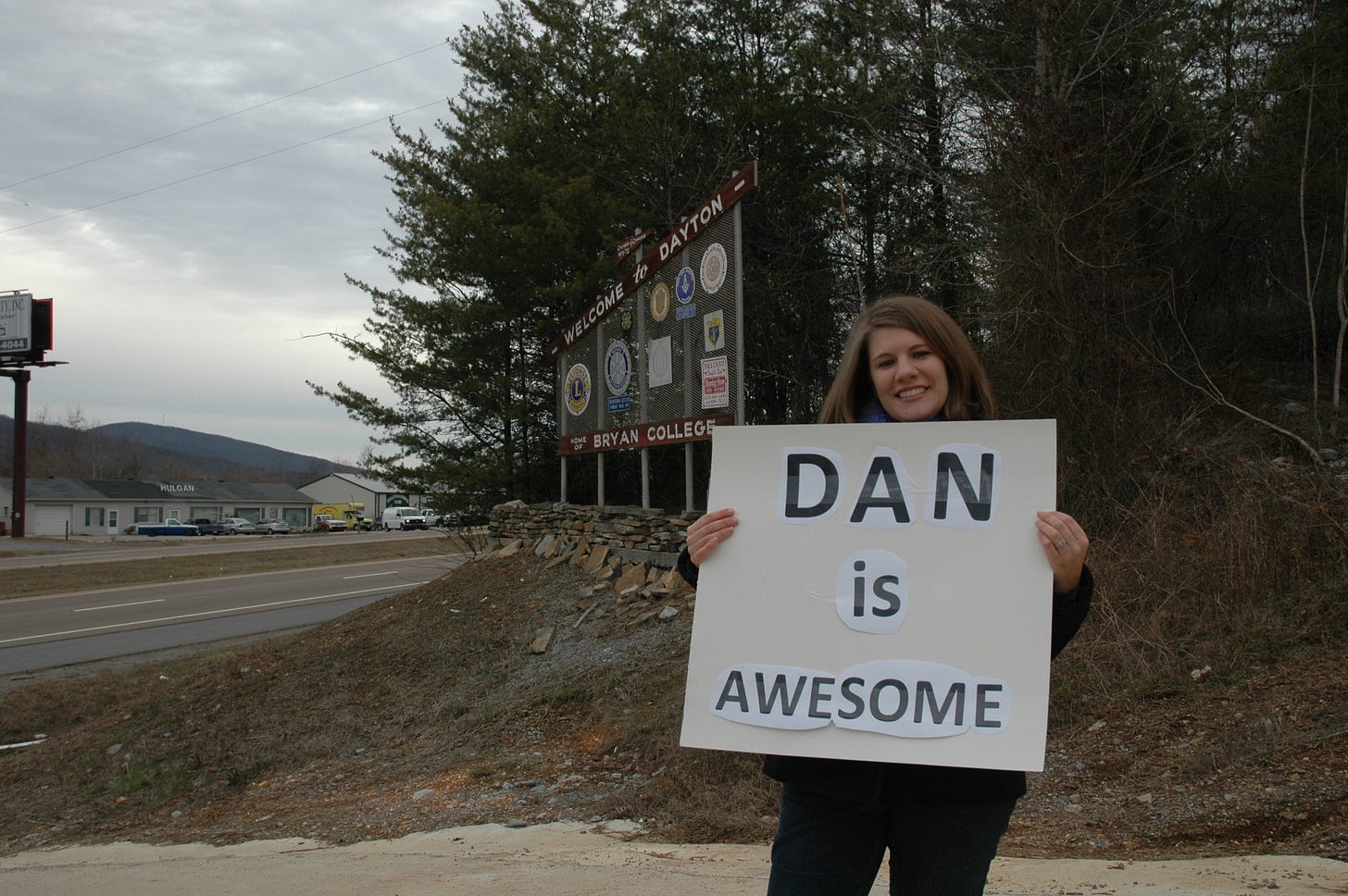
RHE and me at the first Why Christian conference held in Minneapolis in 2015. We founded and hosted WX together in 4 cities over the period of 5 years and it was a peak experience of my life. I broke down absolutely sobbing after everyone had left Rachel’s funeral, partly because the magic things that happened when she and I collaborated are over now. I miss her every day.
eshet chayil
My tattoo artist doesn’t ask me the question I wish he would. It’s May 2019 and I am sitting in his chair, worn and familiar, while he takes a disposable razor and removes the fine hair on my forearm. I’d been here many times before; usually relaxed and chatty, but now I’m shifting awkwardly, like an amateur. I am quietly trudging through the deep grief of losing my friend. He doesn’t ask what the odd words mean that he is applying to my skin, eshet chayil – a memorial tattoo for Rachel held Evans.

Over the last six years, Rachel and I had stood on stage together many times—her, a short, pretty, Southern, young woman in a cardigan; and me, a tall, tattooed city gal in jeans and a black tank top. Rachel always delighted in telling the audience, “I’m so glad Nadia and I became friends as adults because if we had known each other in high school, she would have just scared the bejeezus out of me.”

Why Christian at Grace Cathedral in San Francisco April 2020, just a few weeks before Rachel’s death
We didn’t look like we would be friends. If we had met as eleven-year-olds, though, I promise that we would have been more like a matched set: walking into church in our Sunday school shoes, carrying our well-highlighted NIV bibles, soaking up everything we were taught about how to be “good girls.” Rachel and I were church kids. Faith was our first language.
Then, perhaps not unlike many of you reading this, at some point, our faith unraveled. We began to question what we were taught to accept. But here is where my path and Rachel’s diverged. When Rachel began to doubt, when she tilted her head to one side and looked at the church and the Bible and doctrine from a different angle, she didn't just get angry, say f*ck it, walk away, and consume all the drugs and alcohol she could get her hands on, like I did. Rachel got to work. While I settled for rebelling from Christianity, she strove to redeem it. She studied scripture and the history of interpretation. She wasn’t afraid of hard questions. She pointed out when the teachings of the church were nothing more than camouflage for bias. When others could see only the letter of faith, she insisted on the spirit of it. And perhaps there is no better example of Rachel at her finest than her work on what many women in the church have been told is “The Proverbs 31 woman.”
There are 22 lines of poetry in the 31st chapter of Proverbs, which begin, “Who can find a virtuous woman?” or, with the original Hebrew, “Who can find an eshet chayil”? The verses that follow describe the actions of an upper-class wife: she wakes while it’s still night and makes her husband food; she sews and buys and mends and plants and manages their household-based business. The intention of these verses is to model for a husband how to notice and then praise the work and accomplishments of his wife. And yet an entire Evangelical industry has popped up around it, urging women to attain the cherished status as a “Proverbs 31 wife.” Rachel writes in A Year of Biblical Womanhood (her genius book about trying to live for a year according to every biblical rule for women) “No longer presented as a song through which a man offers his wife praise, Proverbs 31 is presented as a task list through which the woman earns it. . . . We turned an anthem into an assignment.”
As you will discover when you read A Year of Biblical Womanhood, the best translation of eshet chayil is not “woman of virtue” but actually “woman of valor,” and as Rachel teaches us, the most faithful use of Proverbs 31 is not as an unattainable standard women must reach in order to be worthy of praise, but as an example of how much in women’s lives and work is already worthy of praise.
For years, when one of her friends had a baby, finally went into therapy, got a new job, published a book, successfully ordered a pizza to feed her family, confronted injustice, finished a bachelor’s degree in her 60s, or just remembered to pick up the dry cleaning, Rachel exclaimed, “woman of valor!” Because, she reminds us, there is valor—bravery, courage, and strength—in our actions as women.
Rachel turned an assignment into an anthem.
My tattoo artist isn’t asking about any of this, of course, but I’m thinking about every single bit of it while I silently, prayerfully, have eshet chayil tattooed on my arm.
Because twenty-six days ago, I had stood in an ICU room at a Nashville hospital with a small circle of her family and friends. We surrounded her bed to say goodbye as she passed from this life to the next. We prayed and cried and sang and anointed her and struggled to understand why this was happening, why a woman so young, with so much more to write, with so many more years to live with her beloved, with so many more days to raise and cherish her babies, with so many more adventures to take on with her friends, was minutes away from dying. (My friend Rachel did not settle for platitudes or easy answers and so neither will I offer any here.)
I paused to look at a collage of pictures taped to her hospital room wall, including one of her holding a homemade sign that read, “Dan is awesome!” She was standing next to the “Welcome to Dayton” sign in her beloved home town in Tennessee, an act she had done in honor of Proverbs 31:23, “Her husband is respected at the city gates.” I smiled at the grace and good humor Rachel had always applied to her life and her work, grateful for the too-brief gift of it.

Below the pictures sat a small table on which Dan, Rachel’s husband, had affectionately displayed a stack of her books and beside which, he had written a note to the hospital staff: “Rachel is my wife, mother to my children, and best friend. She is also an accomplished writer. Her generous spirit is an inspiration. Her work impacted thousands. Her life was a gift to us all.”
Proverbs 31:28-29
Her husband praises her:
“Many women have done excellently,
but you surpass them all.”
Rachel Held Evans
June 8, 1981 – May 4, 2019
A Woman of Valor to the very end.
-Nadia Bolz-Weber
May 2, 2020




Thank you for loving Rachel in person for the many who could only love her in spirit. Eshet chayil.
We traveled from Las Vegas to be there at that last WC. We just wanted to be in that grand Cathedral and to see you both. I will never forget that time. I will never forget her. It’s not that we don’t know where she is. It is that we always want more. So sad today.